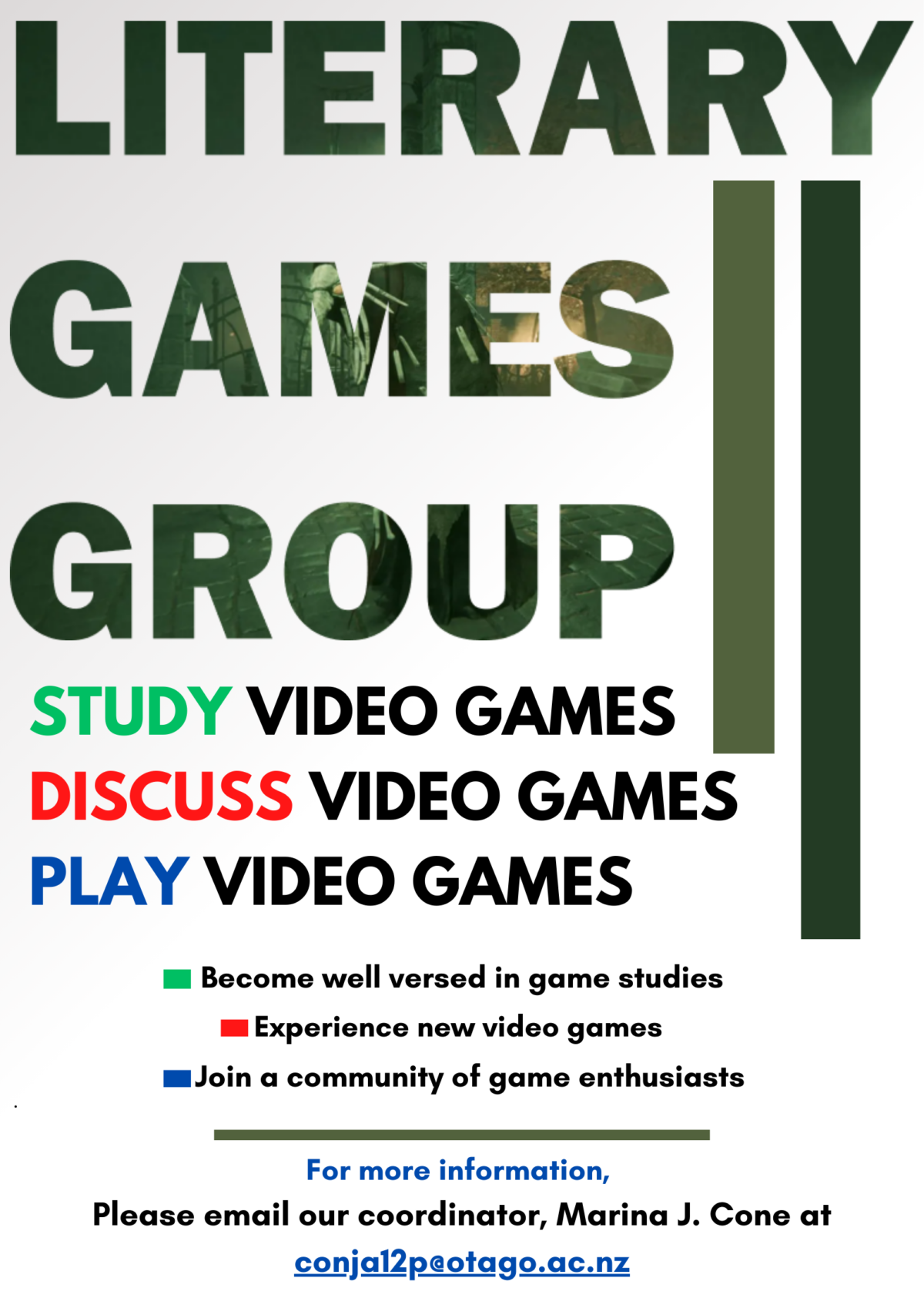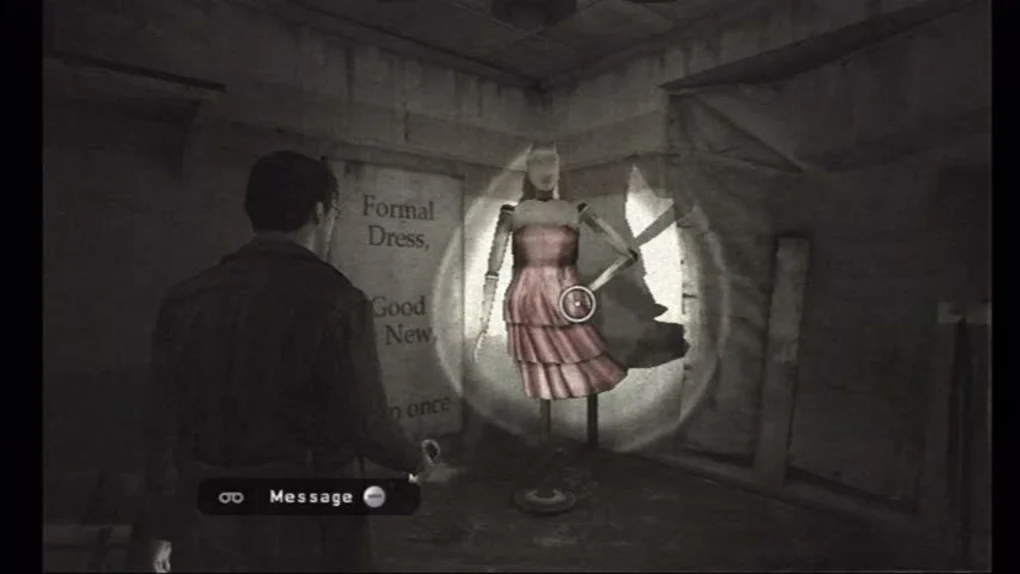In 2025 the Literary Games Group will still be running out of the Digital Humanities Hub (1.C.10) on the first floor of the Arts Building on the Dunedin campus at the University of Otago.
This year we will play a variety of games, from adventure games, to horror, to strategy, and to role-playing games – and everything in between, or outside the bounds of genre entirely.
Each session we casually discuss a reading sent out for the week, before getting stuck into playing games. We all have a go and play collaboratively, experiencing games as a group, whether they be new experiences or familiar ones for people. You don’t have to attend every session either, but of course it is more than welcome, especially if we enjoy a game and decide to continue playing it through from week to week!
To be added to the email list, please send an email to the coordinator for the group, Jacob Cone, at conja12p@otago.ac.nz.
We will be starting in semester one in a few weeks.
Hope to see you there 🙂
the news
Literary Games Group 3/9/24
Hi everyone,
It has been a frenetic few weeks for me, with a lot going on. I have been trying to take the mid-semester break as a bit of a rest period before we get back into the final half of semester 2, 2024. How did that happen?
The last couple of weeks we have been playing through Silent Hill 2, a game which holds a lot of significance for me. Alongside games like Pathologic and The Void, Silent Hill 2 was one of the games that first opened my eyes to the possibilities that video games had as an art form and as a medium for storytelling. It is always a joy to watch people play it through for the first time, so thank you to everyone for indulging my own biases. I hope that it engenders the same feeling of appreciation in those of us in the group, who are playing it in a group setting rather than alone.
What interests me most is Silent Hill 2‘s use of space, and how it unfolds in very special ways. It is worth considering how film grain impacts our interpretation of events as well – some hate it when it comes to video games, but grain can be a part of a visual style so much so that we consider it to add a sense of history and reality. Finally, how do we imagine games outside of actually playing them? We can create our own imagined game worlds, and they can become incredibly personal. That is how I find myself experiencing many game spaces given the time I spend in them for both relaxation and research purposes.
For this week, I’ve selected a reading on video games and space – specifically, video games and tourism. This is a topic that (evidently) always fascinates me and holds my attention. I have been using tourism as a lens in relation to how I discuss ruins recently in my thesis. I hope you find some enjoyment from this week’s reading, the introductory chapter from Tom Van Nuenen’s book “Traveling through Video Games“.
Please let me know if you have any questions or suggestions for the remainder of the semester. If there is anything you would like to discuss or read about, I would be more than happy to oblige. I was even thinking of having a longer session to cap the year off and perhaps celebrate with food afterwards. Let me know if you would be open to that. It’s been a long and very busy year, and would love to commemorate getting through it somehow with a resurrected Literary Games Group!
All the best everyone, have a good relaxing rest of your mid-sem break and a cruisy start to the second half of semester 2!
Literary Games Group 12/3/24
It was great to see people again today! We discussed Nguyen’s chapter on games and agency. The idea that games are tools that inscribe agency is a fascinating one. We are goal-oriented when we play games, and it is interesting to consider our capacity to pick up a game, play it with a goal in mind, and then immediately drop said goal when we stop playing the game. We also brought up morality and moral judgements, imposed on us by the developer. The moral frameworks of each game are something that are worth thinking about, as we must examine how the rules of the game intersect with the fiction.
We started the 2009 horror/thriller Silent Hill: Shattered Memories this week, and plan to continue playing through it next week. The game is particularly relevant to the question of developer-enforced moral judgments, as the game invisibly judges the player on a number of similarly-invisible metrics. The psychological profile it creates might not be accurate, but it is very interesting. As is the question: do we play the game as ourselves, or do we play as the main character, Harry, searching for his missing daughter? When we play a game like this – what is the goal? The goal of a more ambiguous game may differ from player to player, which is what makes playing games like this communally such an enlightening experience.
This coming week, we’ll be reading the introduction of Astrid Ensslin’s “Literary Gaming”, as way back when (in 2021!) it was the first complete reading we did for the group. The name of the group was derived from the book, and the book still acts as a kind of mission statement, defining what exactly a literary game is. I felt it worth including this week as it still works well as a definition.
Looking forward to seeing everyone next week!
[Literary Games Group] 28/7/21 – Outer Wilds
Hi everyone,
This week we had a look at the second chapter of Matthew Spokes’ examination of “Gaming and the Virtual Sublime”, which contained a history of the sublime and ways we could attempt to define it, as well as a few examples of the feeling of the sublime in video games, such as the moment in The Elder Scrolls V: Skyrim where you look down from the top of the Throat of the World, the largest mountain in the game, and see the town you visited just a few hours prior as a bunch of tiny pixels on your screen. That discussion also inspired me to return to Morrowind, which I must do at some point…
Next week we’ll be reading the third chapter of the book, entitled “The Contemporary Sublime”.
We also started the long-awaited “The Outer Wilds“, which is already proving to be a perfect match for the book we are reading. The rolling, endless vistas of space, the fantastic architectural flourishes, and the thrill of discovery and engagement in a video game that is both intelligent and fun should prove to be a continually engaging experience throughout the semester.
Hope everyone has a great week, looking forward to seeing people next week!
[Literary Games Group] 21/7/21 – Definitions and Cycles
This week we looked at the first chapter of “Gaming and the Virtual Sublime: Rhetoric, Awe, Fear, and Death in Contemporary Video Games”, by Matthew Spokes, in which Spokes grapples with broader questions regarding the inherent nature of video games as a definable entity. He examined them from a few different perspectives, but there was a section that was plucked out as being particularly relevant to our group. Spokes says:”research on the impact of games, in terms of their power to offer new ‘possibility spaces’ (Salen & Zimmerman, 2004), socio-political engagement and critical tools for understanding a changing world will begin to show the affective resonance of this form of popular culture, and how far removed it has become from simplistic notions of passively consumed entertainment.”
In the simplest words, games can be (and are) more than just reskinned formulas.
Our reading for next week is Chapter 2 of Spokes’ book, “The Classical Sublime”.
On top of that, we started the semester with Silent Hill 4: The Room’s best level, which showcases the spectacular monster, level and puzzle design of Team Silent at work, the “Water Prison World”. This world works by constructing a layered panopticon with a circular design, meaning that at no moment are you safe or unexposed to danger, and there is always a blind spot around each corner, which means that eerie monsters can ambush you at any time. On top of this, the game is narratively and symbolically engrossing, using any number of fantastically clever tricks to rope you in.
You can purchase the game for yourself here.
Next week we should begin our playthrough of “The Outer Wilds”.
Hope to see you all next week!
[Literary Games Group] 14/7/21 – Start of Semester 2
Hi again everyone for another semester,
This week we set up the literary games group for another semester, for meetings from 12 – 2pm every Wednesday.
We have decided to start the semester with a reading of the book “Gaming and the Virtual Sublime: Rhetoric, Awe, Fear, and Death in Contemporary Video Games”, by Matthew Spokes. The first chapter of this book, entitled “What Are Games For?”, is the reading for this week.
Our basic decision for the games we will play this semester is that we will use “The Outer Wilds” as our long-term project, but we also want to have a slot every session open to play a slice of a game, or just finish a shorter experience. I have also created a document that allows us to sort of see what’s coming up on the horizon and allows us to sort of “schedule in” what games we’d like to play next. It can also be a way to chart games that you might like to come in and see played and discussed. The document can be accessed here.
I have set up the first “game slice” to play, a bit of the classic survival horror game “Silent Hill 4: The Room“, which (mostly) works with the controller!
Hope everyone has a great week ahead, looking forward to reconvening and playing some cool games next week!
[Literary Games Group] 18/5/21 – Dreams of Reality
Hi everyone,
Today we brought The Dream Machine to a close, finishing the sixth and final chapter of the game. It proved to be a truly compelling ending, that, while not bringing a definite conclusion into sight, allows the player to define the final meaning of what you see. In my opinion, the ending merely proves the game’s prowess as both a psychological horror and a well-designed point and click adventure game. It forays into things that I don’t imagine many other games or developers would ever touch, and it’s a thought-provoking marvel, in my eyes. I’ll have to let it sit for a while, but it might be one of my favourite games I’ve ever played.
We also discussed chapter 3 of Galloway’s “Essays on Algorithmic Culture”, “Social Realism”. We discussed games like September 12th, Toywar, and America’s Army in relation to how a player experiences them and then takes bits of the game away in real life, i.e. startling statistics regarding how players who’ve played a lot of skill-based first-person shooters has higher accuracy than trained police officers. We also discussed the level of agency that a player has in a game, and whether or not a diegetic character has more agency than the player (which I disagreed with).
Next week’s reading is chapter four from Galloway, “Allegories of Control”.
Hope to see everyone next week,
Jacob
[Literary Games Group] 12/5/21 – From The First Person
We are tantalizingly close to finishing The Dream Machine. However, we encountered a game-breaking bug that prevented us from continuing. I messaged the developers, and within the span of about three or four hours, they had fixed the bug, so hopefully next session will be the final session required to cap off The Dream Machine and unravel its final mysteries before we begin to take it apart a bit more.
Next week’s reading is another of Galloway’s “Essays on Algorithmic Culture”, this one entitled “Social Realism”. As always we meet every Tuesday at 1pm in the Digital Humanities Hub.
Hope to see everyone next week!
[Literary Games Group] 27/4/2021 – Trauma in Games
Now that Ensslin’s book is finished, we have the first chapter of another book lined up – Alexander R. Galloway’s “Gaming: Essays on Algorithmic Culture”.
We’re also continuing with The Dream Machine. It’s been a long chapter of the game, but I think we’re almost at the end, preparing to move onto the next game in probably two weeks’ time. I have really enjoyed this chapter of The Dream Machine though. I think it has come into its own, after a bit of a slow start, and a few patchier puzzles, that I am glad to see have changed into intuitive puzzles with some sense behind them, that don’t devolve into trial and error.
Hope to see everyone next week!
[Literary Games Group] 20/4/21 – Poetry and Sound
Hello again everyone!
After a two week absence from the LGG, we managed to have an extremely productive and interesting session of the group today. We discussed Ensslin’s Chapter 8, in which she wrote about poetry games, auteurship in video games, and the financial burden that creates a weight of commercial expectation around video games. Poetry games can influence the way we see and experience the written word. In fact, The Dream Machine had a particularly cool example of this. As the player gazes down into a strange abyss, when they speak into it the dialogue fades away into the bottom of the abyss, bouncing off walls. And when you get a reply, it starts small, and climbs to a crescendo. They do this all without sound.There’s a problem in the modern games industry that arises from the inevitable collision of art, vision, profit, and finance. There’s a tension between these two things; how successful can a game be without a big-name publisher? What even is the measure of a video game’s success? The fact that it can last twenty hours, stuffed to the gills with side quests that you’ll forget in a week’s time, or the fact that it is a tight, focused two-hour experience that haunts you for years to come? We talked about other tensions in games too – particularly in an open-world game with a cutscene driven story. Such large teams create games like Red Dead Redemption 2 and Death Stranding, that the design philosophies of the writing and the gameplay team don’t seem synchronized. This is where we get a disconnect, and not an enjoyable one at that.
We continued with Chapter 5 of The Dream Machine, which is growing into its own at this point. The writing is stronger and more confident, and the puzzles are satisfyingly thought-out (once you find where to start). There are two separate dreams to solve in this chapter, and we’ve dabbled in both, but haven’t discovered the truth to either dream yet.
Next week we will finish up with Ensslin’s book, reading Chapter 9 and Chapter 10 (conclusion). Hope to see you there!



![[Literary Games Group] 28/7/21 – Outer Wilds](https://digital-humanities.otago.ac.nz/wp-content/uploads/Outer-Wilds-1200x675.jpg)
![[Literary Games Group] 21/7/21 – Definitions and Cycles](https://digital-humanities.otago.ac.nz/wp-content/uploads/SILENT-HILL-4_The-Room-5_23_2021-8_06_53-PM-1200x675.jpg)
![[Literary Games Group] 14/7/21 – Start of Semester 2](https://digital-humanities.otago.ac.nz/wp-content/uploads/SH4-1200x675.jpg)
![[Literary Games Group] 18/5/21 – Dreams of Reality](https://digital-humanities.otago.ac.nz/wp-content/uploads/cortex-1200x675.jpg)
![[Literary Games Group] 12/5/21 – From The First Person](https://digital-humanities.otago.ac.nz/wp-content/uploads/Falling-1200x675.jpg)
![[Literary Games Group] 27/4/2021 – Trauma in Games](https://digital-humanities.otago.ac.nz/wp-content/uploads/DreamMachine-1200x675.jpg)
![[Literary Games Group] 20/4/21 – Poetry and Sound](https://digital-humanities.otago.ac.nz/wp-content/uploads/dm7-1200x804.jpg)